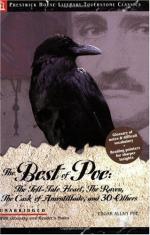|
This section contains 19,145 words (approx. 64 pages at 300 words per page) |

|
SOURCE: "Death and Its Moments: The End of the Reader in History," Modern Language Notes, Vol. 112, No. 5, December, 1997, pp. 836-75.
In the following essay, Pillai considers "The Tell-Tale Heart" as a text that expresses a complicity between the fictional narrator and the reader of the narrative, and a breach in the conventional border between literature and criticism; this breach results in what Pillai calls a narrative's "afterlife. "
On its own account, historiography takes for granted the fact that it has become impossible to believe in this presence of the dead that has organized (or organizes) the experience of entire civilizations; and the fact too that it is nonetheless impossible "to get over it," to accept the loss of a living solidarity with what is gone, or to confirm an irreducible limit.
—Michel de Certeau1
All history, moreover, must more or less blindly encounter the problem of a transferential...
|
This section contains 19,145 words (approx. 64 pages at 300 words per page) |

|


